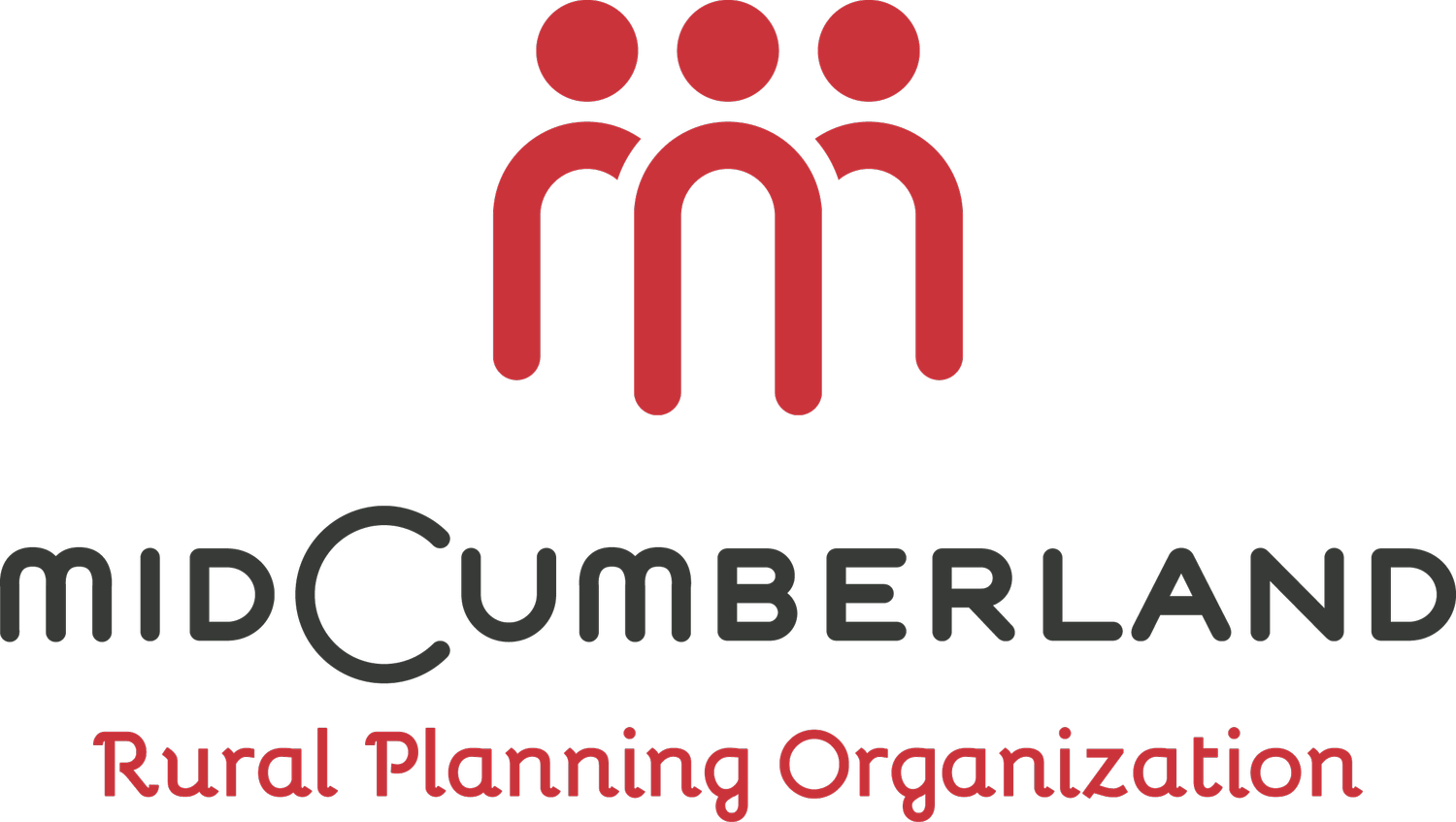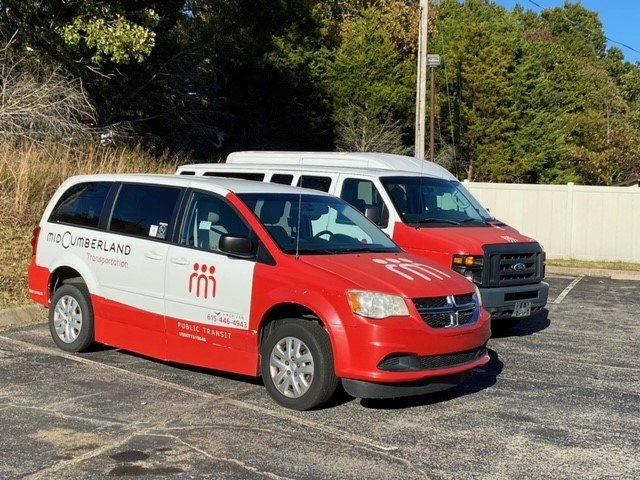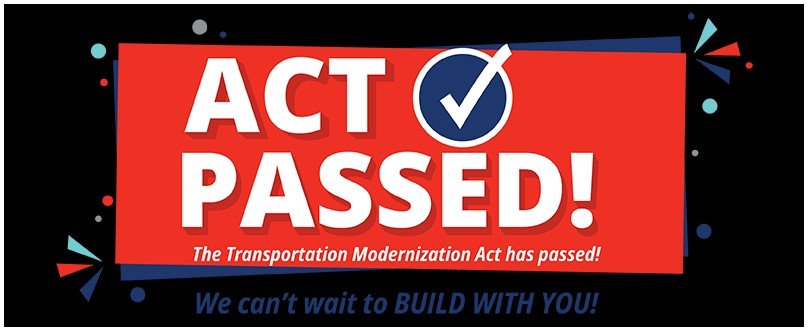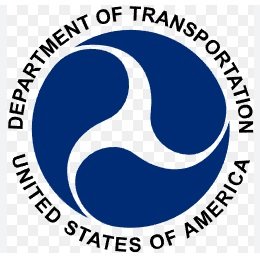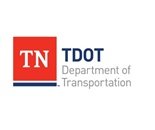Transportation Modernization Act (Build With Us)
The Transportation Modernization Act will provide the state with innovative tools to address traffic congestion, especially in our urban areas, freeing up funding to invest in our rural and suburban communities, all without raising the gas tax or taking on debt.
Click here to learn more about the Transportation Modernization Act, or visit TDOT’s Build With Us.
Local, Regional, State, and Federal Announcements
Public Transportation in the Middle Tennessee RPO
Public Transportation in the RPO is provided by the Mid-Cumberland Human Resource Agency (MCHRA). This public transit service is a curb-to-curb rural transportation system with flexible schedules. Rides are scheduled on a first-come, first-served basis, with priority given to medical appointments. The MCHRA operates a van fleet of over 100 vehicles and serves all 12 Middle Tennessee counties which include beside the five RPO counties, Montgomery, Robertson, Rutherford, Sumner, Trousdale, Williamson, and Wilson counties. For more information on MCHRA’s Public Transit including ride scheduling, please visit https://www.mchra.com/public-transit.
WeGo Public Transit (Link: https://www.wegotransit.com) also provides public transit in Cheatham and Dickson Counties, connecting riders to downtown Nashville via an Express Route operating weekdays. The Dickson Express (Route 88) courses I-40 between Dickson and Nashville, beginning at the Walmart Supercenter in Dickson located on Beasley Drive, and ends at Central Bay on 4th Avenue in downtown. The Clarksville Express (Route 94) courses I-24 between Clarksville and Nashville, beginning at the Clarksville Park & Ride lot on S Gateway Plaza Blvd, just off Exit 11, making one stop in Pleasant View in Cheatham County at the 24 Church just off Substation Road, and ends at Central Bay on 4th Avenue in downtown. For more information on Route 88 or Route 94, please click below. https://www.wegotransit.com/ride/maps-schedules/bus/88-dickson/
https://www.wegotransit.com/ride/maps-schedules/bus/94-clarksville/
VanStar (Link: https://vanstar.com/) is a Middle Tennessee regional ridesharing services solution that connects people who work in the same area, live in the same area and share similar work schedules. The VanStar team manages the vanpool by providing the ridesharing software, the vehicle, insurance, maintenance, a guaranteed ride home and a discounted fuel program. When vanpools are not available, the VanStar team will work to provide you with carpool options. This commute service is managed and operated by The TMA Group on behalf of Regional Transportation Authority/ WeGo Public Transit, Williamson County Government and the Tennessee Department of Transportation.
Carpool opportunities—I-24 and I-40 corridors
For general carpooling opportunities in the RPO region, there is a 30-space park & ride lot in Pleasant View just off Exit 24 of I-24 for local and regional drivers, and located at the corner of U.S. 41A and SR-49, and adjacent to the Shell convenience center and Wendy’s. A 2nd, 75-space park & ride lot is located off Exit 31 of I-24 near the intersection of U.S. 41A and SR-249/Jackson Felts Road, and adjacent to the Twice Daily convenience store. On I-40, an approximate 30-space park & ride lot is located off Exit 182 (Fairview/Dickson Exit). See snapshot below from Googlemaps for park & ride lot location or https://www.google.com/maps/
The Federal Highway Administration (FHWA) offers a new transportation funding program: the Active Transportation Infrastructure Investment Program (ATIIP) which is a great opportunity to construct projects in your community providing safe and connected transportation facilities. The Notice of Funding Opportunity (NOFO) is currently underway until June 17th.
More information about the ATIIP, including what factors the program will be looking for in an application can be found here:
https://www.fhwa.dot.gov/environment/bicycle_pedestrian/atiip/
Section 11529 of the Bipartisan Infrastructure Law (BIL) established ATIIP to provide discretionary grants to eligible entities to plan, design, and construct eligible projects that provide safe and connected active transportation infrastructure in an active transportation network or active transportation spine (BIL § 11529(a)).
USDA Seeks Applications to Support Regional Economic and Community Development Planning to Create Thriving Rural Communities
WASHINGTON, Feb. 13, 2024 – U.S. Department of Agriculture (USDA) Rural Development Acting Under Secretary Roger Glendenning today announced that USDA is seeking applications to implement regional economic and community development projects to create thriving communities for people in rural America.
The 2018 Farm Bill authorized the Strategic Economic and Community Development (SECD) initiative to support projects that will help rural people and economies prepare for the future. It can be used to implement projects that are included in multi-jurisdictional and multi-sectoral strategic community investment plans.
To learn more, read full STAKEHOLDER ANNOUNCEMENT.
USDA is particularly interested in applications that will advance our current Administration’s priorities to:
• Reduce climate pollution and increase resilience to the impacts of climate change through economic support to rural communities.
• Ensure all rural residents have equitable access to Rural Development (RD) programs and benefits from RD-funded projects; and
• Help rural communities recover economically through more and better market opportunities and through improved infrastructure
TDOT Launches Pothole Repairs after Winter Storm
Wednesday, January 24, 2024 | 08:44am
NASHVILLE, Tenn. – Last week’s winter storm has created an abundance of potholes along interstates and state routes. The Tennessee Department of Transportation (TDOT) is launching a statewide effort using all available resources to repair the damaged areas as quickly as possible.
During the prolonged weather event, TDOT crews worked around the clock for several days clearing state routes and assisting motorists. Watch this video.
· 105,500 Staff Hours
· 88,500 Tons of Salt
· 1,500,000 Tons of Brine
· 884,200 Miles Driven
· 1,902 Incidents Managed, Motorists Helped
· 892 Vehicles
**These preliminary numbers are expected to increase slightly at final count
Multiple crews will be patching potholes over the coming days and weeks. Cold mix asphalt is currently being used for repairs. More permanent repairs will be made in spring and early summer when asphalt plants are producing hot mix.
In some cases, motorists should be prepared for short-term traffic delays during these pothole repair operations. While every effort will be made to perform repairs during off-peak travel times (9:00 a.m. – 3:00 p.m. weekdays), some lane closures may extend into the late afternoon, evening, and weekends. We ask drivers to be patient and to watch out for TDOT crews on interstates and state highways. Work with Us – move over, slow down.
Please note – inclement weather, emergency repairs or incidents may disrupt daily schedules. TDOT does not count potholes, keep a tally of how many potholes have been repaired or the cost of repairs per pothole. These repairs are part of normal highway maintenance operations. Drivers can report potholes by calling the TDOTFIX Hotline at 833-TDOTFIX or by submitting an online maintenance request form.
From your desktop or mobile device, get the latest road conditions and live streaming SmartWay traffic cameras at www.TNSmartWay.com/Traffic. Travelers can also dial 511 for travel information or follow us on Twitter at https://twitter.com/myTDOT for statewide travel.
Planning-Related FHWA opportunities
The FHWA Office of Planning, Environment, and Realty (HEP) serves as FHWA's advocate and national leader for environmental protection and enhancement, comprehensive intermodal and multi-modal transportation planning, and for fair and prudent acquisition and management of real property.
HEP provides policy and direction in Transportation Planning, Natural and Human Environment, Project Development and Environmental Review, and Real Estate.
For more information about FHWA’s Planning assistance, please refer to the main site Planning, Environment, & Real Estate - FHWA
Scenic Byways Program
Tennessee’s collection of scenic roadways are a network of Scenic Highways, Tennessee Parkways and Scenic Byways. Roadways in this collection are often the road less travelled, have unmatched intrinsic qualities, and have a regional or national significance. Learn more about these routes, and their designations, by viewing TDOT’s Beautification Division link here.
To learn more about the National Scenic Byways program, please click here.
TDOT Driveway Permits
TDOT’s Region 3 office has a driveway access design process for landowners, developers, engineers, etc., in the community desiring driveway access to the state routes. TDOT encourages adherence to this process and the required design standards when it comes to access drive connection to state routes, especially the pre-application meeting with TDOT staff. The pre-application meetings help expedite the process for driveway permitting and helps eliminate major design changes at the final stages before construction.
A Fact Sheet outlining TDOT’s Driveway Permit process can be found here. For more information, please click the link provided below: https://www.tn.gov/tdot/traffic-design/traffic-engineering-office/highway-entrance-permits.html
The U.S. Department of Transportation (DOT) has opened the process for cities, towns, counties, Tribal governments and Metropolitan Planning Organizations (MPO) to apply for $1.256 billion in funding for local projects that improve roadway safety. The funds are from the competitive grant program, Safe Streets and Roads for All (SS4A), which was created in President Biden’s Bipartisan Infrastructure Law (BIL) to help communities both plan and carry out projects that help reduce the number of deaths and serious injuries on our highways, streets, and roads.
The purpose of SS4A grants is to improve roadway safety by significantly reducing or eliminating roadway fatalities and serious injuries through safety action plan development and refinement and implementation focused on all users, including pedestrians, bicyclists, public transportation users, motorists, personal conveyance and micromobility users, and commercial vehicle operators. The program provides funding to develop the tools to help strengthen a community’s approach to roadway safety and save lives and is designed to meet the needs of diverse local, Tribal, and regional communities that differ dramatically in size, location, and experience administering Federal funding.
Section 24112 of the Infrastructure Investment and Jobs Act (Pub. L. 117–58, November 15, 2021; also referred to as the “Bipartisan Infrastructure Law” or “BIL”) authorized and appropriated $1 billion to be awarded by the Department of Transportation for fiscal year (FY) 2024 for the Safe Streets and Roads for All (SS4A) grant program. This Notice of Funding Opportunity (NOFO) solicits applications for activities to be funded under the SS4A grant program. The FY 2024 funding will be implemented, as appropriate and consistent with law, in alignment with the priorities in Executive Order 14052, Implementation of the Infrastructure Investment and Jobs Act (86 FR 64355).
For more information on the SS4A program, please click here.
2025 Rural Road Safety Week
July 13th - July 19th, 2025
Excessive speeds are a problem across the country. In fact, speeding deaths on rural roads account for 38 percent of all speed-related traffic fatalities in the U.S. That’s over 4,000 deaths a year.
The third week of July is Rural Road Safety Awareness Week (RRSAW). During RRSAW, the National Center for Rural Road Safety promotes topics that raise awareness around road safety in the rural context.
We call on transportation practitioners at every level of the industry to join hands with us to get the message out. Each year heralds in a different theme and every day of RRSAW is used to focus on an aspect of that theme.
The National Center for Rural Road Safety provides coordinated, multidisciplinary, scalable, and accessible safety resources in order to empower rural road users to accelerate road safety improvements and save lives.
https://ruralsafetycenter.org/rural-road-safety-awareness-week/
PROTECT Grant FY2024-26
BUILD Grant FY25
PROTECT
Promoting Resilient Operations for Transformative, Efficient, and Cost-Saving Transportation (PROTECT) Discretionary Grant Program is a competitive grant program created by the Bipartisan Infrastructure Law to plan for and strengthen surface transportation to be more resilient to natural hazards, including climate change, sea level rise, flooding, extreme weather events, and other natural disasters. The Bipartisan Infrastructure Law provides over $1.4 billion over five years through this program to fund projects that address the climate crisis by improving the resilience of the surface transportation system, including highways, public transportation, ports, and intercity passenger rail.
There are four types of PROTECT grants:
Planning
Resilience Improvement
Community Resilience and Evacuation Route
At-Risk Coastal Infrastructure
https://www.fhwa.dot.gov/environment/protect/discretionary/
BUILD
The Better Utilizing Investments to Leverage Development (BUILD) program [previously known as the RAISE program] provides grants for surface transportation infrastructure projects with significant local or regional impact. The eligibility requirements of BUILD allow project sponsors, including state and local governments, counties, Tribal governments, transit agencies, and port authorities, to pursue multi-modal and multi-jurisdictional projects that are more difficult to fund through other grant programs for capital and planning projects to improve safety, environmental sustainability, quality of life, mobility and community connectivity, economic competitiveness, state of good repair, partnership and collaboration, and innovation.
FY 2025 BUILD Grants Notice of Funding Opportunity | US Department of Transportation
2025 Healthy Built Environment (HBE) grant
The Tennessee Department of Health (TDH) supports the creation of healthy built environments to protect, promote, and improve the health and prosperity of all Tennesseans. The places where we live, learn, work, play, and worship shape our communities, ourselves, and each other. A well-designed built environment can decrease obesity, heart disease, and diabetes rates while increasing physical, mental, and social health and building community resilience.
The TDH Office of Primary Prevention offers competitive funding through the Healthy Built Environments (HBE) grant program for planning and construction projects in Tennessee. Funded projects include walking tracks, playgrounds, outdoor fitness stations, greenways and trails, parks and park improvements, outdoor recreation master plans, farmer’s market pavilions, school gardens, and many others. These projects provide greater access to opportunities for physical activity, healthy foods, and social life in communities. The grant program has funded projects in all of Tennessee’s 95 counties, with many in at-risk or distressed counties.
This year, TDH has appropriated $860,000 to fund projects that address health disparities and foster community resilience through planning or construction projects. Planning projects can be awarded up to $50,000, while construction projects can be awarded up to $80,000. Local and State government entities, American Indian tribes, and non-profit entities with 501(c)(3) status are eligible to apply. A grantee match is not required.
Proposed projects should address health disparities, engage community members, support historically underserved populations, and work to promote inclusivity of individuals of all abilities and backgrounds. TDH has identified areas that are eligible based on need. A map of eligible census tracts can be accessed here. Construction projects must be in one of the hi-lighted census tracts, and planning projects must include at least one hi-lighted census tract in the planning area.
Registration for Houston County's Active Living Workshop
The Tennessee Department of Health (TDOH) will be coordinating an Active Living Workshop in Houston County on April 6th and April 8th. This will be two one-hour events led by the Regional Healthy Development Coordinator (HDC) with participants consisting of elected officials, health council members, community members, and/or other stakeholders.
During the events, an education session will be offered on design principals of a healthy built environment that creates opportunities for physical activity and access to healthy foods. Then, a walk audit and asset mapping session will be completed with all the participants in a stretch of their community that they are interested in improving. During the walk audit, members note assets that align with healthy design principals and those that could be improved. Participants will then map their community’s assets and areas of improvement.
Finally, the participants form an action plan on next steps to improve the areas they defined and continue with improving the design of their community to foster health.
Registration for Houston County’s Active Living Workshop is provided by link below. Register for one or both days. For more information, please contact Vinny Black, Healthy Development Coordinator, at 615-253-4736 or Vincent.Black@tn.gov
National Electric Vehicle Infrastructure Program (NEVI)
The federal Infrastructure Investment and Jobs Act (IIJA) or Bipartisan Infrastructure Law (BIL) includes a total of $7.5 billion in dedicated funding to expand electric vehicle (EV) charger accessibility to all Americans, of which $5 billion of this will go towards the NEVI Program. Of that amount, $88 million over 5 years will go to Tennessee’s electric vehicle infrastructure program (TEVI.)
To learn more about the Tennessee’s NEVI program, please click here.
Link to TEVI program interactive site:
For a helpful website to search for charging stations in Tennessee, please visit the chargepoint.com site here. ChargePoint - Station Map
National Center for Rural Road Safety—Training Announcements
The National Center for Rural Road Safety offers a number of training opportunities on speed management, impaired driving, and conflict analysis in an effort to inform and educate the local practitioners on ways to reduce serious injury and fatalities on local and regional roadways. Implementation of Vision Zero planning, decision-making, investments, prioritization, and accountability methods can be discovered in webinars offered throughout the year. Please visit the National Center for Rural Road Safety to learn more about these training opportunities. Home - National Center for Rural Road Safety (ruralsafetycenter.org)
